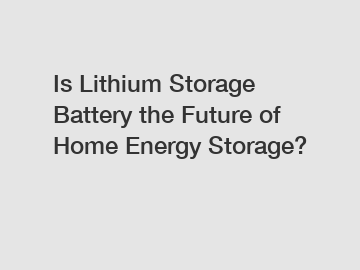Is Lithium Storage Battery the Future of Home Energy Storage?
Is Lithium Storage Battery the Future of Home Energy Storage?
When it comes to powering homes, energy storage solutions have become increasingly popular. One of the most talked-about options is the lithium storage battery. But, is it really the future of home energy storage? Let's dive in and find out.
What is a lithium storage battery?

A lithium storage battery is a rechargeable battery that uses lithium as one of its active components. These batteries are known for their high energy density, long lifespan, and ability to hold a charge for extended periods of time. They have become a common choice for a variety of applications, including electric vehicles, smartphones, and now, home energy storage systems.
Advantages of lithium storage batteries for home energy storage.
1. High energy density: Lithium storage batteries can store a large amount of energy in a relatively small and lightweight package, making them ideal for homes with limited space.
2. Long lifespan: Lithium batteries can outlast many other types of batteries, with some models lasting up to 10 years or more. This means fewer replacements and lower maintenance costs for homeowners.
3. Fast charging and discharging: Lithium batteries can charge and discharge quickly, making them a reliable source of power for homes that experience frequent fluctuations in energy demand.
4. Rechargeable: Lithium batteries are rechargeable, allowing homeowners to store excess energy from renewable sources like solar panels or wind turbines for later use.
Is it cost-effective?
While the initial cost of installing a lithium storage battery system in your home can be high, the long-term savings can make it a cost-effective solution. With lower maintenance costs, longer lifespan, and the ability to store excess energy from renewable sources, homeowners can see a significant return on their investment over time.
Is it environmentally friendly?
Lithium storage batteries are often touted as a more environmentally friendly option compared to traditional lead-acid batteries. They have a lower carbon footprint, require less maintenance, and can be recycled at the end of their lifespan. This makes them a sustainable choice for homeowners looking to reduce their impact on the environment.
Are there any drawbacks?
While lithium storage batteries offer many advantages, there are some drawbacks to consider. The upfront cost of installation can be prohibitive for some homeowners, and there is still some uncertainty surrounding the long-term performance and safety of these batteries. Additionally, there are concerns about the environmental impact of lithium mining and disposal.
In conclusion, the future of home energy storage may very well be lithium storage batteries. With their high energy density, long lifespan, and rechargeable capabilities, they offer a promising solution for homeowners looking to store excess energy and reduce their reliance on the grid. While there are still some challenges to overcome, the potential benefits make lithium storage batteries a promising option for the future.
If you are interested in installing a lithium storage battery system in your home, contact us to learn more about our supplier options and get started on your journey to energy independence.
For more Scalable single phase string inverter, Durable single phase string inverter, Energy security hybrid storage inverterinformation, please contact us. We will provide professional answers.
101
0
0


Comments
All Comments (0)